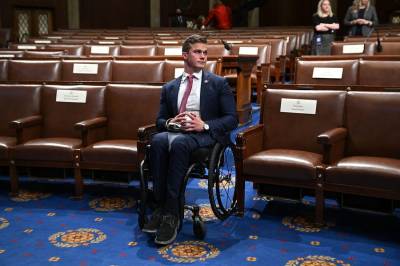With his upset win over a Trump-endorsed candidate in North Carolina’s 11th District in 2020, Rep. Madison Cawthorn—freshman Republican from North Carolina and Congress’s youngest member—burst into politics as an unknown commodity. With a tragic backstory (he’d lost the use of his legs in a car crash) and central-casting good looks, Cawthorn was a blank slate onto which smitten Republicans projected remarkable attributes. A college dropout, Cawthorn presented himself as a self-made entrepreneur and real estate investor; conservative media ate up the story of a wunderkind who, in the memorable phrase of one Washington Examiner writer, was “a student of ancient Rome and Athens.”
Two years later, much of the shine has come off—leaving Cawthorn facing a Republican primary that’s gotten much more interesting than it otherwise would have been. From his personal story to his political brand, it’s hard to find a single political attribute of Cawthorn’s that hasn’t sprung some kind of leak.
Various flourishes of his telling of the tragic accident turned out to be embellished, as did his former supposed real-estate career. A number of female students at Patrick Henry College, where Cawthorn spent part of a year, accused him of inappropriate sexual behavior.
His political identity, meanwhile, is composed of a mish-mash of odd and contradictory gestures. He campaigned on aisle-crossing civility, then marked his election victory by tweeting “cry more, lib.” He took the stage at Donald Trump’s infamous January 6 rally to denounce “all the fraud [Democrats] have done in this election,” then pivoted in the wake of the Capitol riot, appearing on CNN to admit that “I think I would say that the election was not fraudulent”—before pivoting again once it became clear Trump was sticking to his stolen-election guns, telling a group of Republicans last summer that “if our election systems continue to be rigged, and continue to be stolen, then it’s going to lead to one place, and it’s bloodshed.”
And Cawthorn has lent ammunition to arguments he’s out of his depth in Congress with questionable strategic decisions and a remarkable barrage of gaffes. In just the last few months, he’s been charged with driving with a revoked driver’s license, called Ukrainian President Volodymyr Zelensky a “thug” who runs an “incredibly evil” government, and provoked outrage among fellow Republican lawmakers by saying on a podcast that politicians “that I’ve looked up to through my life” had invited him to orgies and done cocaine in front of him.”
But his biggest political misstep came last fall, when he stuck his thumb in the eye of state Republicans by announcing he’d hop a district line to run for reelection in the newly drawn 13th District—a seat widely believed to have been drawn as a home for state House Speaker Tim Moore to run for national office. Then, when that map was struck down by state courts, he announced he’d move his campaign again—back to his home district and the voters whom he’d just bid farewell.
If not for that move, he’d have breezed to renomination in next month’s Republican primary and thus to reelection in his heavily Republican district. But his brief absence provided an opportunity for several GOP challengers to throw their hats in the ring—and once in, figured they might as well stick around despite the return of the prodigal incumbent. Michele Woodhouse, a former staunch ally of Cawthorn who announced her candidacy just a week after he announced he’d switch districts, has opened fire against him since his return.
Cawthorn’s 13th-District dalliance also drew state Sen. Chuck Edwards into the 11th-District race, and Edwards now boasts the endorsement of GOP Sen. Thom Tillis. Cawthorn has “fallen well short of the most basic standard western North Carolina expects from their representatives,” Tillis said in a statement last month. “Chuck Edwards has proven he’s a hardworking conservative leader who delivers conservative results.”
“Chuck Edwards is a three-term state senator from Cawthorn’s home county of Henderson County,” Chris Cooper, a professor of political science at Western Carolina University, told The Dispatch. “He has won all three elections with healthy margins, so he’s somebody who has support. And the location of his support is key—his support comes from Henderson County … the real source of Republican strength in the 11th Congressional District. So he has this unique ability to be able to get the establishment vote, but also perhaps get some of the hometown vote. And Cawthorn did incredibly well in Henderson County last time, so it makes sense that that would happen.”
The impression you might get from all this is that things haven’t been going particularly well for Cawthorn. And indeed, by basically any narrative metric, you’d think the young lawmaker’s career would be dead in the water. And yet!
Last week, the conservative Carolina Journal reported that an internal Edwards poll showed a tightening race between himself and Cawthorn. But “tightening” is relative—back in March, Cawthorn led Edwards by 32 points, 52 percent to 20 percent. Fresh on the heels of the raft of scandals mentioned above and Tillis’ endorsement of Edwards, Cawthorn now leads by—20 points, 44 percent to 24 percent. (Six other candidates, including Woodhouse, combined for 15 percent in the latest poll, with 16 percent undecided.) While Cawthorn has undeniably slipped in the opinion of his constituents, in other words, he’s still leading the pack by a serious margin.
With the primary still more than a month out, there’s still time for Edwards, Woodhouse, and others to eat into that lead. North Carolina’s unusual primary rule stipulate that a candidate needs to break 30 percent of the vote to avoid a runoff with the second-place finisher. Edwards’ pollster Glen Bolger is a widely respected operative; if his current polling is accurate and the race continues to tighten at its current speed, Cawthorn could end up flirting with that 30 percent threshold. After that, who knows?
Then again, it’s remarkable—given the breathtaking run of bad press Cawthorn has had—that it requires that many assumptions and leaps of logic just to see a path to victory for his opponent. Even if we do see a runoff, this may be one of those exceptions that proves the rule: It’s amazing how far the natural strength of incumbency and the primary-proofing of strong MAGA credentials will get you in today’s Republican Party.






Please note that we at The Dispatch hold ourselves, our work, and our commenters to a higher standard than other places on the internet. We welcome comments that foster genuine debate or discussion—including comments critical of us or our work—but responses that include ad hominem attacks on fellow Dispatch members or are intended to stoke fear and anger may be moderated.
With your membership, you only have the ability to comment on The Morning Dispatch articles. Consider upgrading to join the conversation everywhere.